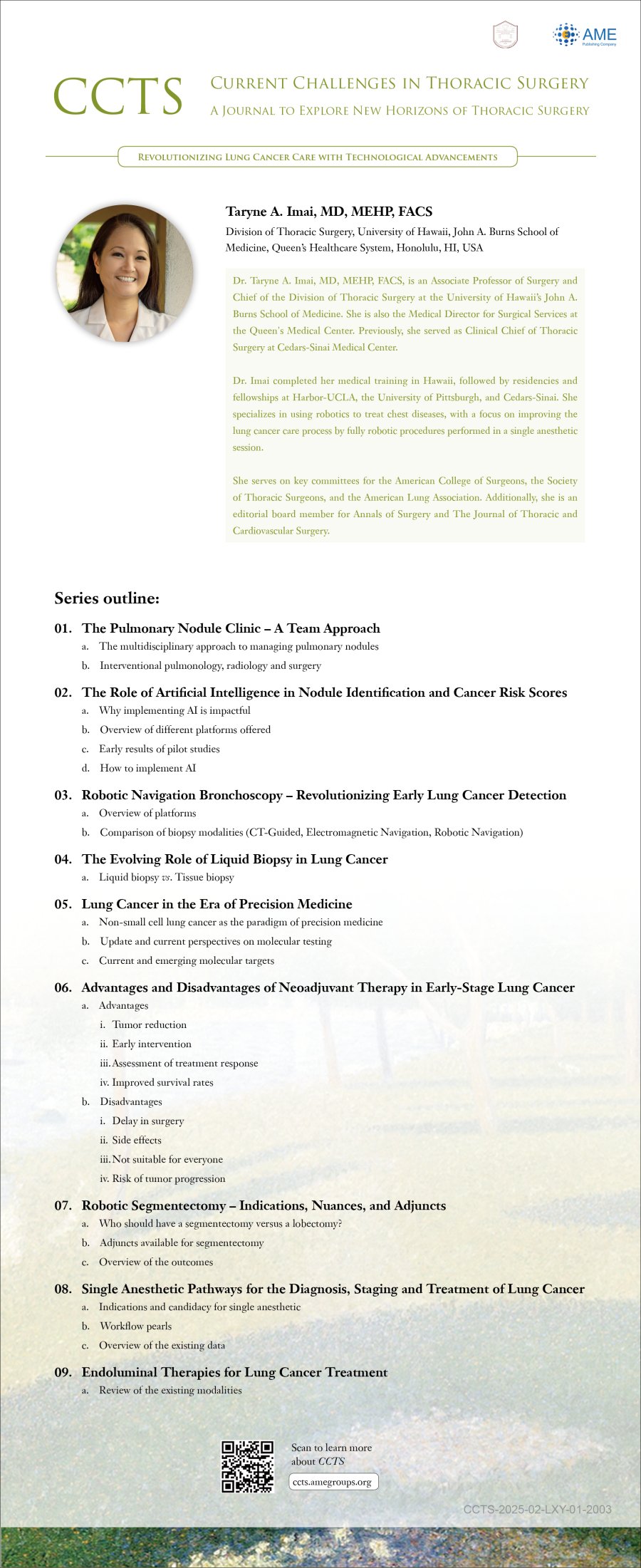
This series on “Revolutionizing Lung Cancer Care with Technological Advancements”, edited by Dr. Taryne A. Imai from University of Hawaii, explores innovative technological advancements which have been transforming the way we approach lung cancer care and offering new hope and improved outcomes for patients.
Taryne A. Imai, MD, MEHP, FACS
Division of Thoracic Surgery, University of Hawaii, John A. Burns School of Medicine, Queen's Healthcare System, Honolulu, HI, USA
Dr. Taryne A. Imai, MD, MEHP, FACS, is an Associate Professor of Surgery and Chief of the Division of Thoracic Surgery at the University of Hawaii’s John A. Burns School of Medicine. She is also the Medical Director for Surgical Services at the Queen's Medical Center. Previously, she served as Clinical Chief of Thoracic Surgery at Cedars-Sinai Medical Center.
Dr. Imai completed her medical training in Hawaii, followed by residencies and fellowships at Harbor-UCLA, the University of Pittsburgh, and Cedars-Sinai. She specializes in using robotics to treat chest diseases, with a focus on improving the lung cancer care process by fully robotic procedures performed in a single anesthetic session.
She serves on key committees for the American College of Surgeons, the Society of Thoracic Surgeons, and the American Lung Association. Additionally, she is an editorial board member for Annals of Surgery and The Journal of Thoracic and Cardiovascular Surgery.
Series outline:
1. The Pulmonary Nodule Clinic – A Team Approach
a. The multidisciplinary approach to managing pulmonary nodules
b. Interventional pulmonology, radiology and surgery
2. The Role of Artificial Intelligence in Nodule Identification and Cancer Risk Scores
a. Why implementing AI is impactful
b. Overview of different platforms offered
c. Early results of pilot studies
d. How to implement AI
3. Robotic Navigation Bronchoscopy – Revolutionizing Early Lung Cancer Detection
a. Overview of platforms
b. Comparison of biopsy modalities (CT-Guided, Electromagnetic Navigation, Robotic Navigation)
4. The Evolving Role of Liquid Biopsy in Lung Cancer
a. Liquid biopsy vs. Tissue biopsy
5. Lung Cancer in the Era of Precision Medicine
a. Non-mall cell lung cancer as the paradigm of precision medicine
b. Update and current perspectives on molecular testing
c. Current and emerging molecular targets
6. Advantages and Disadvantages of Neoadjuvant Therapy in Early-Stage Lung Cancer
a. Advantages
i. Tumor reduction
ii. Early intervention
iii. Assessment of treatment response
iv. Improved survival rates
b. Disadvantages
i. Delay in surgery
ii. Side effects
iii. Not suitable for everyone
iv. Risk of tumor progression
7. Robotic Segmentectomy – Indications, Nuances, and Adjuncts
a. Who should have a segmentectomy versus a lobectomy?
b. Adjuncts available for segmentectomy
c. Overview of the outcomes
8. Single Anesthetic Pathways for the Diagnosis, Staging and Treatment of Lung Cancer
a. Indications and candidacy for single anesthetic
b. Workflow pearls
c. Overview of the existing data
9. Endoluminal Therapies for Lung Cancer Treatment
a. Review of the existing modalities
Disclosure:
The series “Revolutionizing Lung Cancer Care with Technological Advancements” was commissioned by the editorial office, Current Challenges in Thoracic Surgery without any sponsorship or funding. Dr. Taryne A. Imai serves as the unpaid Guest Editor for the series.
